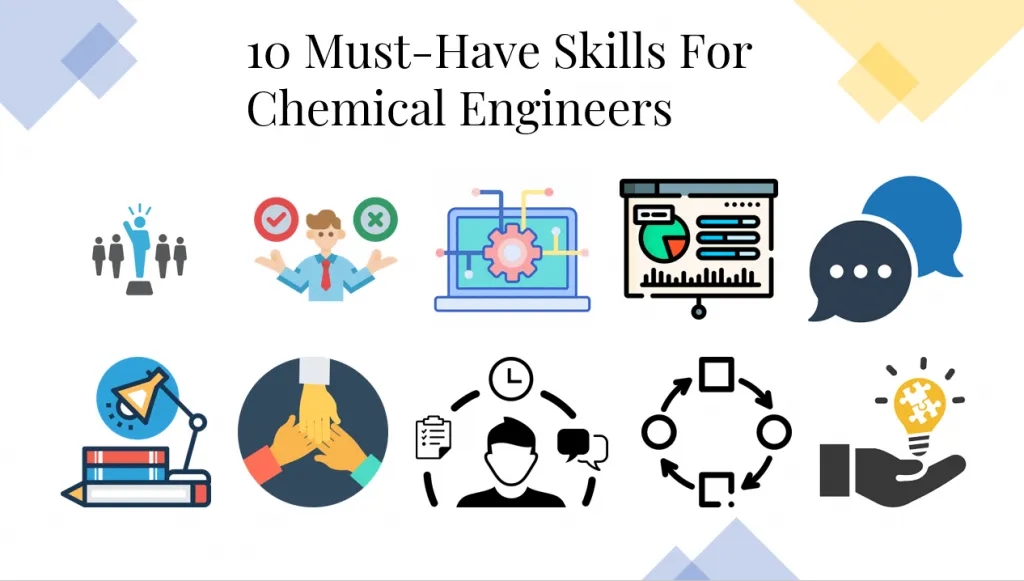
As described by Sergio Berretta in this article,
“Chemical engineers are at the forefront of solving many societal challenges facing us today. We find them working on the development of processes and technologies such as fuel cells, conversion of greenhouse gas (GHG) emissions to green chemicals, mining of electronic waste, vertical farming, new vaccines, medical devices, or conversion of wood to fabrics for clothing, just to name a few.”
Given the important roles chemical engineers play in society, it is important to understand what the most important skills in industry are to succeed in your career aspirations and increase your value proposition as a potential job candidate.
In summary, the most important skills for a chemical engineer, regardless of industry, include:
The above mentioned skills, just like any other, can be categorized into hard and soft skills.
Hard Skills are related to the technical expertise and knowledge necessary to fulfill the responsibilities of a particular role. For example, a chemical engineer working on pipeline design must be technically adept at fluid mechanics and flow simulation software. Examples of hard/technical skills important to chemical engineering include:
Soft Skills, also called social skills, refer to the non-technical aspects of chemical engineer’s responsibilities. Chemical Engineering is an extremely collaborative discipline and the value of developing these soft skill must not be understated. Examples of these skills include:
Here’s are Chemical Engineer, Dr. Adedeji’s thoughts on the must-have skills for chemical engineers to develop:

Chemical Engineer at Syncrude Canada
What are the Must-Have Skills for a Chemical Engineer?
There are a number of skills Chemical Engineers can have, both technical and non-technical. Some of these skills may cut across other disciplines while others are unique to specific areas of specialization. I will address a few technical skills I have identified to be fundamental to Chemical Engineers.
1. Mathematical modelling: A chemical engineer must be able to represent unit processes, physical phenomena, and chemical systems with a set of equations that can be used to describe and understand their behaviour.
2. Process scale up: It is important for a chemical engineer to be able to translate lab- and bench-scale processes into pilots and commercial scale plants through process design, synthesis, and development.
3. Optimization: Selection of the safest, best performance, and most economically process and operating conditions is something a chemical engineer would always face in the industry.
4. Computer Skills: This cannot be over-emphasized. Knowledge of at least one programming language (MATLAB, R, or Python), spreadsheets (Excel), and a process simulator (HYSYS, Aspen Plus, ChemCAD) is essential.
The list is not exhaustive but these are the chemical engineering-specific skills I have had to use repeatedly in my experience. As aforementioned, other skills like research, critical thinking, problem solving, analytics, decision-making, project management, communication and leadership skills are equally important for a successful engineering career.
Regardless of whether you choose to work in Operations or Process design, your role as a chemical engineer entails that you must possess a strong technical background. A chemical engineer’s day to day activities involve interfacing with process equipment such as pumps, heat exchangers, reactors etc. therefore a firm grasp of their operating principles will facilitate the completion of your tasks and projects.
Core chemical engineering undergraduate courses such as Transport Phenomena, Process Control, Mass and Energy Balances play an important role in troubleshooting process issues and failure modes. A good understanding of Physics is also beneficial as the working principles of most process equipment are governed by physical laws.
Engineers by nature are problem solvers. Chemical engineers in particular solve problems such as process design from conceptualization to commissioning or process issues and upsets.
Some of the important job responsibilities performed by chemical engineers that utilize this skillset include feasibility studies, root-cause analyses (RCA) and Hazard and Operability Analyses (HAZOP). These activities task chemical engineers to think creatively about solutions to process issues and potential safety and environmental risks.
Chemical engineers typically play different roles in multiple projects and are also responsible for leading their own projects. Project management is an essential skill for the planning and execution of projects by mapping them out into key phases.
Chemical engineers work very closely with process data. These include operating pressures, temperatures and flows of process inlets and outlets. To assist with troubleshooting exercises, it is important for a chemical engineer to effectively learn how to analyze data and draw insights into the process from it. Visualizations and dashboards are also important story-telling tools as findings are presented to key stakeholders.
Microsoft Excel is an important tool that all chemical engineers must develop a proficiency in and is a mainstay in industry for data collection and analysis.
A lot of software and computer skills used by chemical engineers are industry specific. Some software examples of popular software programs used by chemical engineers include Aspen Plus/HYSYS, Matlab, Python, Excel etc. You can read more about the top software and computer skills for chemical engineers here.
Chemical engineering is a highly collaborative discipline therefore, strong communication skills are necessary to streamline the flow of information. Effective communication allows chemical engineers to understand and present ideas quickly and accurately, avoiding misunderstandings which often lead to decreased cross collaboration and lower productivity.

Process Engineer
“I would say the most important soft skills would be communication (verbal and written). These are critical to being a process/chemical engineer in any work environment as you collaborate with a lot of people from different backgrounds and experience levels.
Chemical engineers often work closely with other engineering disciplines, scientists, regulators, procurement, and stakeholders. Effective collaboration is the cornerstone of any successful organization and improving this skill will significantly accelerate your professional career.
Given the plethora of industries chemical engineers find themselves in, it is important to be proactive in equipping oneself with the necessary skills and knowledge to be able to thrive in these new facilities, operations and companies.
A chemical engineer must possess a high level of curiosity to bolster their knowledge of the ins and outs of a process.

Senior Process Engineer , YouTuber at ProcesswithPat
If you take three graduate chemical engineers and put them into different operational industries, let’s say oil & gas, pharma, and water treatment, those three engineers would end up exposed to vastly different process and equipment technology, different modes of operation, different procedures, and different design philosophies. They would walk out of their respective jobs knowing things that might at their core be the same field that uses the same fundamentals, but their skillsets would not allow them to be interchanged without them feeling out of their depths (at least at first).
On top of that, none of them would have the in-depth and behind-the-scenes know-how of the companies that designed those processes; that is all intellectual property that companies don't want to get out, not even to the companies that use their technologies daily.
Given this, it is incredibly difficult to advise on what technical skills an engineer should have. Each industry is unique and would use those skills to varying degrees. One principle that I have used, moving between different industries, is to never act like you know something that you do not.
Have the humility to acknowledge what you do not know, and the drive to change that. When you ask someone to explain anything that you do not understand, you should only be satisfied when you understand that concept so well that you are able to explain it to somebody else. We all have an internal voice that tells us when we are speaking about something that we do not understand but are acting as if we do. Silence that voice that tells you “Ok, now you are speaking sh!t", not by ignoring it, but by being hungry for understanding.
I have often found myself in meetings during times of plant crisis, surrounded by opinionated people who speak confidently and in a way that makes them sound as if they understand the problem deeply. At the same time, I know how much of my time I have spent trying to understand the problem at hand, and know that what they are saying is inaccurate, and there is no way the speaker can understand the problem nearly as well as I do, given that they have not put in the time to understand it. Do not be that speaker.
My top skill for any chemical engineer is to always doubt what you know, but always do your utmost to reverse it.
Here is a one of Patryk’s recent YouTube videos titled “Think Like a Chemical Engineer” where he proposes 3 principles that have helped him succeed in his career.
Be sure to subscribe to his channel and leave a like and comment.
Excellent decision-making skills for chemical engineers is imperative. Typically, chemical engineers who work particularly in operations are responsible for changes that have huge ramifications. Having a robust and refined process in place that allows you to make the right decisions with accurate data and knowledge is a crucial skillset to develop as a chemical engineer and a leader.
Every chemical engineer is a leader in some respect. Leadership is closely linked with proactivity and taking initiative. Being able to take the initiative to perform the necessary steps to validate an idea, collaborate with the right stakeholders, and execute is an important part of the responsibilities carried out by chemical engineers.
Chemical Engineers work across a variety of industries.
Every job will require their own unique skills to succeed although the skills discussed in this article will pave a way for success in your career journey as a chemical engineer.
2 Responses
Dear theengineersperspectives.com administrator, Thanks for the valuable information!
Dear theengineersperspectives.com owner, Your posts are always well-supported by facts and figures.